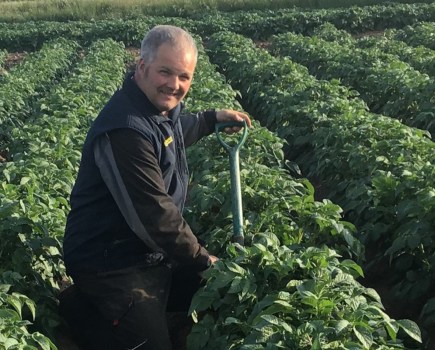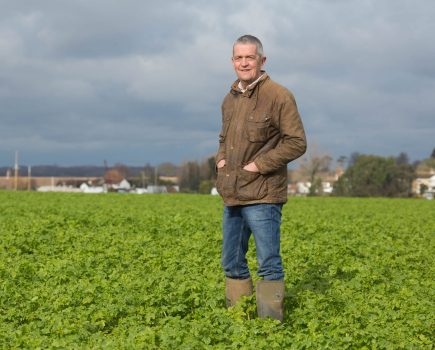The mid-winter machinery show now seems a firm fixture in the arable farming calendar. At first glance it seems a strange idea to pick a time of year when it’s too wet for field work and too cold to be kicking tyres and holding conversations outdoors.

It’s notable that the German equivalent, Agritechnica in Hanover, and the French version, SIMA in Paris, are sensibly held indoors in vast heated halls. In Britain we do things differently – we freeze our nuts off. (Wheel nuts, that is). But as we know, that’s because we’re British and a little bit of cold can easily be sustained with a free cup of tea which is always not far away from any self-respecting machinery salesman.
The French and the Germans might have scantily clad female ‘experts’ handing out literature from their centrally heated stands but us Brits know better than to be distracted (or heated) by such cheap sexist exploitation of the female form. And while I am on that sordid subject I’m told that some visitors to ag shows in Paris or Hanover make fools of themselves in dens of iniquity after leaving SIMA or Agrictechnica. Fortunately you don’t find that sort of thing in Peterborough, at least not that I’m aware of, so quite rightly and much more cheaply it’s straight home afterwards with decency and virtue firmly intact.
LAMMA has become quite a show, though. It’s come a long way over the last ten years. Admittedly Lincoln, which is where it started from and what the L still stands for, is not that far from Peterborough where it’s held now but in terms of size it seems to go from strength to strength. With 40,000 farmers visiting this year it certainly is attracting a healthy gate. Of course the free entry probably helps keep gate numbers up. (The organisers of the Cereals show need to take note.) So even if you’re not buying anything more than a sausage sandwich, you can still justify a day off the farm in Jan and a day out at LAMMA.
It was interesting that normally when you meet up at LAMMA the usual opener to the conversation is the weather but this year it was ‘have you got your BPS payment yet?’ Unfortunately for the salesmen on the stands, the answer was usually ‘no’. You had to feel a bit sorry for the brave RPA staff manning the stand. I bet the health-and-safety drill beforehand recommended hard hats and Kevlar vests as the recommended dress, not to mention ear defenders.
But clearly the main thing that was probably keeping a lock on the machinery budget purse for most visitors at LAMMA wasn’t the late arrival of our BPS payment but rather wheat at £110/t. I couldn’t help but work out what the various bits of polished machinery cost in terms of production from anarea of wheat, based on average yields. Most the tractors seemed to be costing in excess of what you might reasonably expect off 120ha of cereals whereas self-propelled sprayers were more like 240ha. As for combines, well I simply don’t have that many acres. Of course the depressing bit was that when compared to machinery at LAMMA just three years ago in 2013 using the same ‘area of wheat’ currency metric then everything had doubled in price in 2016 – even the sausage sandwiches.
It seems a bitter irony that just as things like improved robotics and in-cab telemetry are improving rapidly on fairly standard bits of kit, we haven’t got the necessary dosh to invest in technology that would make us more efficient. Just as the necessary electronics and engineering to help improve our margins becomes available we find the means to purchase it, namely money, is in short supply.
It reminds me of a tale my father used to tell of how farmers would attend County shows in the 1930s to stand boggle-eyed and penniless in front of stands displaying the latest revolution for farmers – the tractor. The result was always the same – a forlorn return back to the farmyard to harness up the horses. It took 50 years and the advent of the Second World War for the average farmer to be able to afford tractor technology on British farms. Let’s hope it doesn’t take 50 years for the current generation of farmers to afford the current generation of technical advancement that’ll help us grow crops more efficiently thereby optimising input use and optimising things like carbon footprints.
So LAMMA for me this year, was largely about ‘window shopping’. Or to put it more precisely ‘investigating technology investment opportunities in readiness for the forthcoming economic upturn’. Fear nor machinery salesmen of Britain, your time will come.



